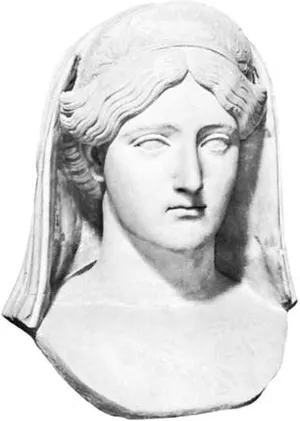A statesman’s wife who became the quiet engine of a regime, Livia Drusilla shaped succession, ceremony, and the ethics of rule from 38 av. J.-C. to 14 apr. J.-C., then cast a long shadow to 29 apr. J.-C. and beyond; the guiding question is simple: how did a Roman matron become the template for imperial consorts without ever holding office?

One August evening at Nola in 14 apr. J.-C., rumors whispered ahead of the news: the princeps was dying, the succession delicate, and a mother’s counsel decisive. In later retellings, a sensational tale claimed Livia had “smeared with poison some figs” on the tree Augustus favored, a vignette at once lurid and revealing about where contemporaries located power in Rome’s first dynasty. Strip away the melodrama and a clearer picture emerges: for roughly half a century—from her marriage to Octavian in 38 av. J.-C. to her death in 29 apr. J.-C.—Livia organized households, reconciled rivals, disciplined reputations, and made continuity possible in a state still unlearning civil war. After Augustus’ death she was adopted into the Julian line as Julia Augusta, a singular honor that formalized a role she had already performed: mediator of access, model of conduct, and custodian of the regime’s domestic-familial legitimacy. The thesis advanced here is provisional but precise: Livia’s influence rested on a fusion of domestic exemplar, political intercessor, and semi-sacral presence—what later observers would recognize as the prototype of an imperial “first lady.” The article unfolds in four moves: first a concise genesis of Livia’s position; then a documented narrative of her actions; third, a causal analysis of how that influence worked; and finally, the historiographical debate over poison, power, and precedent.
Context and genesis
Born into the Claudian branch and later linked to the Livii Drusi through adoption, Livia’s aristocratic pedigree predated her celebrity. Married first to Tiberius Claudius Nero, she bore Tiberius in 42 av. J.-C. and Drusus not long after, before Octavian engineered a politically consequential divorce and remarriage in 38 av. J.-C., a move Tacitus later framed as a transgressive founding gesture of the new order. The marriage to Octavian was childless but publicly exemplary, staging conjugal harmony as a political resource and allowing Livia to perform a meticulously curated matronal ideal—modesty, fertility signaled by past motherhood, and managerial competence—within the ever-expanding domus Augusta. She cultivated a reputation for dignified beauty and restraint that portraiture confirmed, anchoring a persona crucial to Augustus’ effort to bind moral reform to political stabilization after decades of proscriptions and civil war. By the time Augustus’ position solidified, Livia was less an ornament than a node in a network of patronage and prudential advice; senatorial petitions sometimes reached the princeps through her, and even hostile sources show her interceding effectively. When the Julio-Claudian succession began to fray—Marcellus dead in 23 av. J.-C., Gaius and Lucius gone in 2 and 4 apr. J.-C., Agrippa Postumus ultimately eliminated—Livia’s maternal line offered the only credible adult heir in Tiberius, making her both mother of a successor and custodian of transition.

Narrative
In Tacitus’ opening books, senators crowd around “Julia Augusta,” proposing to style Tiberius “son of Julia,” while calling Livia parent or even “mother of the nation,” revealing both her prominence and Tiberius’ unease with the elevation of women. Tiberius immediately trimmed the sails of this cult, denying her a lictor and blocking an altar to her adoption, a tactical reduction that nevertheless confirms a horizon of honors unprecedented for a Roman wife. The will of Augustus adopted her formally into the Julian family and conferred the name Julia Augusta, consolidating her status as institutional partner in the new sacred history of the Principate. Narratives of the death at Nola accentuate the choreography of secrecy and control—Livia publishing favorable bulletins and regulating access—features presented by Tacitus as evidence of managed succession even when framed by suspicion. The most famous calumny—Dio’s fig-tree poison—captures not a fact so much as an anxiety, the fear that a mother’s influence might reorder the lines of inheritance at the apex of the state. After 14 apr. J.-C., Livia’s honors multiplied in proposal but not always in realization; Tiberius refused certain monumental exaltations, frustrated by the political implications of a woman honored as near-equal cofounder. Yet her cultural capital endured, and Velleius Paterculus crystallized the loyalist view, praising Livia as “in all respects more like the gods than humans,” language that signals how contemporaries conceptualized her aura and its limits. Livia died in 29 apr. J.-C.; only in 42 apr. J.-C. did her grandson Claudius complete her apotheosis, deifying her as Diva Augusta and fastening her definitively into Rome’s political theology.

Analysis
Livia’s power operated at three interfaces—household, senate-court, and symbol—and all three were mediated through conduct codes legible to elite Romans. Within the domus, she managed personnel, marriages, and reconciliations, translating domestic order into regime stability in a polity that pretended its monarchy was a family matter. At the senate-court interface, she acted as intercessor, a role evidenced by episodes where her entreaties shielded petitioners, functioning as a pressure valve for a suspicious new emperor and as a conduit that personalized authority. Symbolically, the matronal ideal—veil, chastity, frugality—became statecraft, a grammar by which the Augustan regime preached moderation while monopolizing decision-making, with Livia’s person as exemplar and advertisement. Honors proposed for her during Tiberius’ reign, even when refused, chart a horizon of permissible female sacrality and civic persona unprecedented in republican memory, foreshadowing the cultic fusion later completed by Claudius. In short, Livia’s “first ladyship” did not consist in decrees or commands but in gatekeeping, modeling, and mediating—a distinctly Roman form of soft power whose effectiveness depended on the credibility of her virtue and the reality of her proximity.

Historiographical debate
Ancient sources are sharply divided, forcing modern readers to triangulate between praise, insinuation, and institutional evidence. Tacitus foregrounds suspicion—stepmother’s hatred, veiled manipulations of succession, and a Tiberius who curtails his mother’s elevation—not as court gossip but as a moralized narrative of power’s corruption. Cassius Dio preserves the fig-poison anecdote and gathers rumors of involvement in the deaths of Marcellus, Gaius, Lucius, and perhaps even Germanicus, cataloguing stories that map elite anxieties more than judicial findings. By contrast, Velleius Paterculus offers formal panegyric, placing Livia within a repertoire of exemplary piety, a perspective that helps explain her broad acceptability in elite culture even amid factional rancor. Modern scholarship, led by Anthony A. Barrett and complemented by work on public female honors, treats the poisoning charges as tendentious, noting logistical implausibilities and the inherent bias of moralizing historiography, while emphasizing the institutional novelty of Livia’s honors and roles. The result is a cautious consensus: Livia’s influence was real and structurally central; the murder narratives are unproven, often improbable, and illuminate more about Roman gendered suspicion than about her criminality. Even so, the persistence of those stories matters because they helped script the repertoire available to later writers and rulers, ensuring that every subsequent “Augusta” would be read through the twin lenses of ideal matron and wicked stepmother.

Legacies
As “Julia Augusta,” Livia established the template for imperial womanhood: a semi-public office combining familial authority, cultic association, and soft political brokerage. The senatorial impulse to style her mater patriae—thwarted by Tiberius—shows how quickly Rome began imagining a state stabilized by maternal symbolism as much as paternal command. Claudius’s deification of Livia in 42 apr. J.-C. consummated that symbolic rearrangement, giving durable institutional form to a role that would shape expectations for Agrippina the Younger and later empresses. In art and memory, Livia’s dignified portraits and coinage fixed the image of the empress as moral exemplar, a figure at once domestic and sacral, intimate and foundational.
Conclusion
Call her the first “first lady” or, more Romanly, the princeps femina: Livia’s genius was to make the domestic virtues of a matron do the constitutional work of an uncodified monarchy. Her influence did not depend on spectacle or an office; it depended on proximity to decision, mastery of reputation, and a symbolic economy that converted household credibility into political consent. The poison tales, whether malice or myth, testify inadvertently to that success; rumors thrive where institutions are personal and where mothers matter to succession. Fifty years of shadow rule thus become legible not as conspiracy but as continuity management, the quiet labor of making the first dynasty thinkable, livable, and transmissible. In that sense, Livia did not merely support the Augustan settlement; she taught the empire how to have a consort and, through her deification, how to sanctify that role for generations.
- 59/58 av. J.-C.: Birth of Livia Drusilla into the Claudian-Livius Drusus nexus of Roman aristocracy.
- 42 av. J.-C.: Birth of Tiberius; Livia’s status as proven mother becomes politically salient.
- 38 av. J.-C.: Marriage to Octavian, later Augustus; the domus Augusta begins to take canonical shape.
- 23 av. J.-C.: Death of Marcellus; succession anxieties intensify across the Julio-Claudian house.
- 2 et 4 apr. J.-C.: Deaths of Lucius and Gaius Caesar; Tiberius emerges as primary adult heir.
- 14 apr. J.-C.: Death of Augustus at Nola; Livia adopted as Julia Augusta in his will.
- 29 apr. J.-C.: Death of Livia; delayed fulfillment of several posthumous honors.
- 42 apr. J.-C.: Claudius deifies Livia as Diva Augusta.
- The fig-poison story: Dio’s vivid anecdote—“smeared with poison some figs”—is the most cited but least credible allegation, reflecting elite fears about maternal power over succession.
- Tacitus’s stance: The Annals insinuate stepmotherly hostility and highlight Tiberius’s curbs on Livia’s elevation, a narrative frame that moralizes monarchy through gendered suspicion.
- Counterweights: Velleius’ praise and the institutional record of honors suggest acceptance rather than alarm, while modern scholars stress logistical and evidentiary gaps in the murder tales.
- Bottom line: Influence demonstrable; poison unproven.
Sources
Primary texts: Tacitus, Annales (books 1–5) for senatorial reception, succession insinuations, and Tiberius’s limits on Livia’s honors; Cassius Dio, Roman History 56.30 for the fig-poison anecdote; Velleius Paterculus 2.94–131 for panegyrical praise of Livia’s virtues and aura; Suetonius (Lives) for snippets on Augustus’s last words and Claudian commemoration; epigraphic and numismatic testimony summarized in standard reference syntheses. Modern scholarship: Anthony A. Barrett, Livia: First Lady of Imperial Rome; studies on female public honors and Augusta cults; overviews in Encyclopaedia Britannica; analyses of Livia’s role as femina princeps.

Quotes cited in text
“smeared with poison some figs” (Cassius Dio 56.30)
“mother of the nation” (Tacitus, Annales 1.14)
“more like the gods than humans” (Velleius 2.130)

